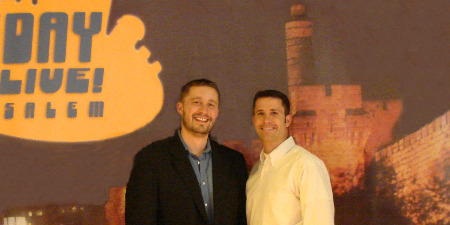A TV variety hour, filmed live in Jerusalem on Tuesday nights, is taking its show on the road, starting with Texas.

“Tuesday Night Live” (TNL) in Jerusalem has gone to Texas.
TNL, a Jerusalem-based English-language television program broadcast overseas, reaches 24 million homes in North America on the Time Warner and Direct TV networks, and can be seen worldwide over the Internet.
A young volunteer crew headed by producer Rachel Gluck, 29, formerly of New Jersey, has staged 53 episodes of the viewer-supported variety hour before live studio audiences at Jerusalem’s Hechal Shlomo Theater since 2008.
Now the unabashedly pro-Israel show is on the road, starting at The Westin Galleria Hotel in Houston on August 10.
The Israel they never see
“We believe this pilot will be very successful, based on the buzz it’s already created in the Jewish and non-Jewish world here,” co-host Jeremy Gimpel told ISRAEL21c on the phone from Texas as he wrapped up a pre-show lecture tour of college campuses and community centers in California, Colorado, Florida, Kansas, New York, New Jersey, North Carolina, Oklahoma, Pennsylvania, South Carolina and Washington State.
Atlanta native Gimpel, 30, says the concept behind TNL is “to show the world the Israel they never see – the Israel we left America for, the beautiful and spiritual sides of Israel – to encourage viewers to see the beauty of the land and its people and to take pride in it.”
Gimpel and co-host Ari Abramowitz, a 30-year-old immigrant from Houston, provide a platform for politicians, educators, activists, entertainers, newsmakers, spiritual leaders and the ‘people in the street.’ The show regularly sells out to an English-speaking audience comprising Jews and Christians of various nationalities and levels of religious observance. They hope to achieve the same mix in Texas.
“If we are successful here, then we will start looking at doing shows in other states,” relates Gimpel. “People are looking for a way to express their support of Israel and celebrate it in a positive, upbeat way. We’ve also been invited to Toronto. We have viewers in Ireland, England and Australia and we would love to go there as well.”
The duo’s on-air chemistry comes from their off-air relationship as best friends and reservists in the same army unit. “I’m Ari’s commander; he is a sharpshooter. That is central to our dynamic,” says Gimpel, who moved to Israel at age 12 and holds degrees in law and business in addition to rabbinical ordination. Soon after completing active duty as an infantry platoon sergeant in Gaza, he began sharing his experiences with visiting Americans.
“Groups started inviting me to America, and then I got invited to have a radio show [on Israel National Radio]. A TV show seemed like the natural next step,” he explains.
A new musical culture
TNL guests have ranged from Jewish Agency chairman Natan Sharansky and Jerusalem Post deputy managing editor Caroline Glick to former Israeli Ambassador to the US Danny Ayalon and Major Dr. Mitchell Schreiber, head of the Israel Defense Forces medical team that ran a field hospital for Haitian earthquake victims last January.
Every show has a musical interlude between the current events-oriented first half and the spiritually-oriented second half, showcasing Israeli or immigrant talent playing everything from Southern blue-grass to klezmer.
“We already have a list of 20 bands that want to be on the show next year,” says Gimpel. “It’s important for people to see there is a new musical culture in Israel.”
The Houston segment will spotlight the Israeli band Pey Dalid, as well as an interview with Rep. Louie Gohmert (R-Texas), author of a Congressional resolution that would support Israel’s right to use “all means necessary to confront and eliminate nuclear threats posed by Iran.”
Based on viewer feedback, Gimpel and Abramowitz believe that TNL reaches across religious and national barriers.
“Our non-Jewish viewers… love the fact that whereas the voice usually coming from Israel is full of political jargon about UN resolutions, we’ve gotten back to the fundamentals of what it’s like to be proud Zionists returning to our homeland,” says Gimpel. “So many activities lately have been against things, but we aren’t against anything; we’re for something.”













